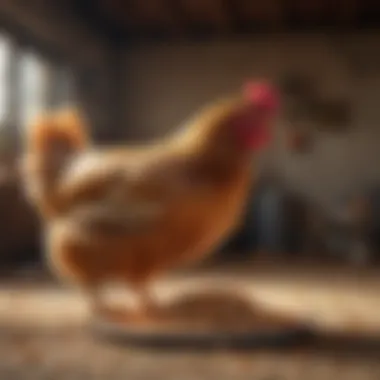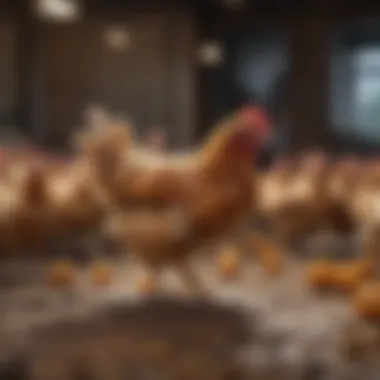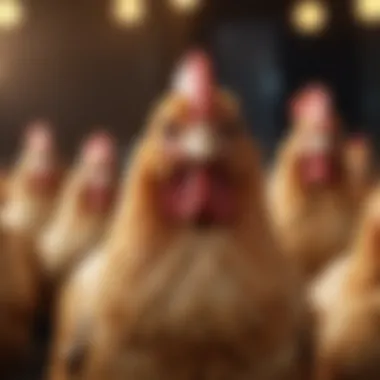Unveiling the Challenges of Chicken Keeping: A Comprehensive Guide


Pet Care Essentials
Embarking on the journey of chicken keeping presents a spectrum of vital tasks and responsibilities, akin to nurturing any living creature. Understanding the foundational aspects of pet care essentials is paramount in fostering a healthy and sustainable relationship with your feathered companions.
Daily Nutrition Requirements
Ensuring your chickens receive a balanced diet brimming with essential nutrients is the cornerstone of their overall well-being. From high-quality poultry feed to supplemental treats rich in vitamins and minerals, meeting their daily nutritional requirements is crucial for promoting robust growth and vitality.
Exercise and Playtime
Promoting physical activity and mental stimulation through designated playtime and free-range exploration is imperative for the holistic health of your flock. Encouraging natural behaviors like scratching, pecking, and foraging not only keeps chickens active but also enhances their quality of life.
Grooming Tips
While chickens are adept self-groomers, occasional maintenance such as nail clipping and feather inspection may be necessary. Additionally, providing dust baths for your flock aids in regulating oil production and removing parasites, contributing to their overall hygiene.
Health and Wellness Check-ins
Regular health check-ups and observant monitoring of your chickens' behavior and physical appearance play a pivotal role in early disease detection. Familiarizing yourself with common health issues and consulting with avian veterinarians promptly ensures proactive care and swift intervention if needed.
Continuing down the path of understanding and refining your chicken caretaking skills, cultivating a nuanced comprehension of their behavior and training techniques is essential in nurturing a harmonious relationship rooted in mutual respect and trust.
Behavior & Training
Understanding Your Pet's Body Language
Interpreting the subtle cues conveyed through body language enables you to decipher your chickens' emotions and intentions. From recognizing distress indicators to deciphering social hierarchies within the flock, honing your observation skills cultivates a deeper connection with your avian companions.
Basic Training Techniques
Implementing positive reinforcement techniques fosters desired behaviors and reinforces obedience among your chickens. Through patient and consistent training sessions, you can instill commands and routines that promote cooperation and mitigate potential behavioral challenges.
Behavioral Concerns & Solutions
Addressing behavioral issues such as aggression, egg-pecking, or territoriality necessitates a nuanced approach grounded in empathy and understanding. Redirecting negative behaviors through environmental enrichment and targeted interventions facilitates a harmonious coexistence within the flock.
Socialization Tips
Facilitating social interactions among your chickens fosters a sense of community and belonging. Encouraging communal activities and minimizing stressors supports healthy social dynamics, reinforcing bonds and minimizing instances of conflict.
Crafting a nurturing and enriching habitat for your feathered companions serves as the cornerstone of their well-being and contentment. Implementing a thoughtful pet home environment tailored to their needs ensures a harmonious cohabitation and enriching living space.
Pet Home Environment
Creating a Pet-friendly Space
Designing a chicken-friendly environment encompasses elements such as adequate space, shelter, and access to fresh water and feed. Prioritizing safety and comfort in the layout of their living quarters promotes a sense of security and facilitates natural behaviors.
Safety Measures and Hazards to Avoid
Identifying potential hazards within the chicken coop and surrounding areas is essential in safeguarding your flock from harm. Mitigating risks such as predators, toxic plants, and insecure perches empowers you to create a secure haven for your chickens.


Choosing the Right Toys and Accessories
Enriching your chickens' environment with stimulating toys and interactive accessories augments their mental agility and physical dexterity. From puzzle feeders to perches of varying heights, incorporating engaging elements enhances their quality of life and promotes overall well-being.
Setting Up a Comfortable Resting Area
Providing cozy nesting boxes and roosting spots cater to your chickens' instinctual need for security and rest. Ensuring ample bedding materials and a tranquil environment fosters a sense of relaxation and promotes healthy sleeping patterns among your flock.
Vigilance in monitoring and maintaining your chickens' health encompasses a comprehensive grasp of common ailments, preventative care measures, and preparedness for emergencies. Equipping yourself with the knowledge and resources to address health issues ensures the longevity and vitality of your avian companions.
Pet Health Issues
Recognizing Signs of Illness
Attentive observation of subtle changes in behavior and physical appearance is key to early illness detection. Identifying signs of distress or abnormality prompts timely intervention and minimizes the impact of potential health concerns on your flock.
Preventative Care Measures
Implementing proactive health protocols such as routine vaccinations and parasite control safeguards your chickens against preventable diseases. Embracing a preventive care regimen tailored to their specific needs fortifies their immune system and promotes sustained well-being.
Common Ailments and Treatments
Familiarizing yourself with prevalent chicken ailments, from respiratory infections to nutritional deficiencies, equips you to address health challenges effectively. Establishing a rapport with a poultry-savvy veterinarian ensures access to guidance and treatment options tailored to your flock's individual health requirements.
Emergency Preparedness
Developing a comprehensive emergency plan encompassing first-aid supplies, contact information for avian experts, and evacuation procedures is crucial in mitigating risks during unforeseen crises. Proactive preparedness empowers you to respond swiftly and decisively in safeguarding your chickens' welfare.
Introduction
Keeping chickens can be a rewarding experience, showcasing the delicate balance of joy and responsibility that comes with poultry ownership. This section explores the nuances and challenges of maintaining a flock of chickens, offering guidance and insights for both beginners and seasoned chicken keepers. From legal considerations to daily care routines, this article aims to provide a comprehensive overview of what it takes to raise chickens successfully.
Overview of Keeping Chickens
Raising chickens has witnessed a surge in popularity in recent years, with an increasing number of individuals opting to embrace this practice. The shift towards self-sustainability and organic living has propelled the growing trend of chicken keeping, highlighting the desire for fresh eggs and a deeper connection to nature. This subsection delves into the reasons behind this trend, emphasizing the benefits of having a personal flock, fostering a sense of self-reliance and environmental consciousness.
The Growing Trend of Chicken Keeping
The rising fascination with chicken keeping stems from a desire to reclaim food sovereignty and reduce reliance on commercial sources. Urban and rural dwellers alike are drawn to the simplicity of raising chickens, providing a direct link to their food source. Despite misconceptions, chickens are low-maintenance animals that offer not only eggs but also companionship and pest control, making them a multifaceted choice for individuals looking to enhance their homestead.
Benefits of Raising Chickens
The benefits of raising chickens extend beyond the obvious fresh eggs, encompassing a holistic approach to sustainable living. Chickens aid in fertilizing the soil, reducing food waste through composting, and even serving as therapy animals, promoting emotional well-being. Their presence in a household encourages responsible management practices and serves as an educational opportunity, especially for children, on the importance of caring for animals and understanding the food production process.
Issues to Consider Before Getting Chickens
Before embarking on a chicken-keeping journey, it is imperative to address key considerations to ensure a smooth transition. Factors such as space availability, local ordinances, and personal commitment must be evaluated. Understanding the responsibilities associated with chicken care, from providing adequate housing to monitoring health, is crucial for a successful poultry venture. Additionally, preparing for potential challenges like predator attacks and seasonal changes can help mitigate risks and safeguard the well-being of the flock.
Purpose of the Article
Delving further, this article aims to shed light on the challenges that accompany chicken ownership, offering insights into common hurdles and how to overcome them effectively. By exploring these difficulties, both aspiring and experienced chicken keepers can enhance their knowledge and skill set, ensuring the well-being of their feathered companions.
To Explore the Challenges of Keeping Chickens


Keeping chickens poses a myriad of challenges, from disease prevention to ensuring adequate nutrition for optimal health. This subsection navigates through these obstacles, presenting practical solutions and best practices for mitigating risks. By understanding the complexities of chicken care, individuals can navigate through the nuances of poultry management with confidence and efficiency.
To Offer Guidance to Prospective Chicken Owners
For individuals considering introducing chickens into their lives, practical guidance is essential to set a strong foundation for avian care. This section provides insights into selecting suitable breeds, establishing a feeding regimen, and creating a comfortable living environment for chickens. By offering guidance on the initial steps of chicken ownership, this article equips prospective chicken owners with the knowledge needed to embark on a fulfilling and enriching poultry journey.
Initial Considerations
When embarking on the journey of keeping chickens, one must delve into the realm of initial considerations, a pivotal aspect that sets the foundation for a successful poultry ownership experience. Why are initial considerations crucial, you may wonder? Well, dear reader, these considerations encompass a spectrum of elements that include legal regulations, space requisites, and financial commitments. Each of these facets necessitates meticulous evaluation before taking the plunge into chicken ownership.
Legal Restrictions and Zoning Laws
Understanding Local Regulations
Delving into the intricate tapestry of local regulations governing chicken keeping is paramount. By deciphering the nuances of these regulations, prospective chicken owners can steer clear of legal entanglements. Embracing an understanding of local laws ensures compliance, fostering harmony with neighbors and authorities alike. The essence of comprehending local regulations lies in creating a sustainable and legally sound environment for keeping your feathered companions.
Permit Requirements for Keeping Chickens
Unraveling the complexities of permit requirements for keeping chickens unveils another layer of necessity in the realm of poultry ownership. Obtaining the requisite permits not only demonstrates a commitment to responsible chicken rearing but also showcases adherence to governmental guidelines. The process of acquiring permits for chicken keeping may seem daunting at first, but in essence, it safeguards the interests of both the chickens and their custodians, paving the way for a smooth and lawful chicken keeping journey.
Space and Housing Requirements
Coop Design and Size Considerations
The pivotal aspect of coop design and size considerations cannot be overstated when venturing into chicken keeping. Crafting an optimal living space for your chickens involves a thoughtful blend of functionality and comfort. Choosing the right coop design and size sets the stage for a conducive environment that promotes the well-being and productivity of the hens. The unique feature of catering to specific coop design and size criteria lies in fostering a secure and cozy habitat that aligns with the natural needs of chickens.
Predator-proofing the Chicken Enclosure
Another indispensable aspect in the realm of space and housing requirements is predator-proofing the chicken enclosure. Safeguarding your feathered friends from lurking threats demands meticulous attention to detail. Implementing robust predator-proofing measures not only fortifies the structural integrity of the coop but also shields the inhabitants from potential harm. The unique feature of predator-proofing lies in its proactive approach towards mitigating external risks, ensuring a safe haven for the chickens to flourish.
Initial Investment and Costs
Budgeting for Chickens and Supplies
Embarking on a chicken keeping journey entails a prudent consideration of the initial investment and ongoing expenses. Budgeting for chickens and supplies forms the financial backbone of responsible poultry ownership. By delineating a comprehensive budget encompassing variable costs like feed, bedding, and healthcare, aspiring chicken owners can navigate the fiscal landscape with prudence. The distinct advantage of meticulous budgeting lies in fostering financial sustainability and foresight in chicken care.
Long-term Maintenance Expenses
Delving into the realm of long-term maintenance expenses casts a spotlight on the enduring financial implications of chicken keeping. Beyond the initial investments, recurring expenses like healthcare, repairs, and upgrades add to the long-term financial tableau. Understanding the significance of allocating resources towards maintenance fosters a culture of longevity and sustenance in chicken husbandry. The unique feature of focusing on long-term maintenance lies in fortifying the resilience of the chicken rearing endeavor, ensuring enduring care and security for the beloved flock.
Daily Care and Maintenance
Daily Care and Maintenance plays a crucial role in the overall well-being and productivity of your chickens. Consistent and proper care ensures that your flock remains healthy, content, and continues to provide you with fresh eggs. Regular maintenance tasks are essential to prevent health issues, monitor the condition of your chickens, and address any potential problems promptly. By developing a structured care routine, you create a comfortable environment for your chickens to thrive.
Feeding and Watering Chickens
Feeding your chickens a balanced diet is vital for their growth, egg production, and overall health. Choosing the right feed is a critical aspect of chicken care. Selecting feeds rich in essential nutrients such as proteins, vitamins, and minerals is key to supporting your chickens' well-being. Ensuring a clean water supply is equally important, as water is essential for digestion, egg-laying, and body temperature regulation. Fresh, clean water prevents dehydration and helps maintain your chickens' health.
Choosing the Right Feed
Choosing the Right Feed depends on your chickens' age, breed, and purpose (egg-laying or meat production). High-quality feeds tailored to their nutritional requirements promote optimal health and productivity. Balanced feeds reduce the risk of deficiencies and boost immune function, leading to robust and thriving chickens. Varieties of feeds cater to specific needs, such as growth stages and special dietary requirements, offering a diverse selection to meet your chickens' unique needs.
Ensuring Clean Water Supply


Ensuring Clean Water Supply involves providing access to fresh water at all times. Clean water sources prevent bacterial growth and contamination, safeguarding your chickens' health. Automatic waterers or founts with proper cleaning schedules ensure a consistent supply of clean water. Monitoring water levels, especially during hot weather, is crucial to prevent dehydration and heat stress in your flock.
Health and Veterinary Care
Maintaining the health of your chickens is paramount to their longevity and productivity. Recognizing common health issues in chickens and providing timely interventions are key responsibilities of a chicken owner. Regular check-ups and vaccinations strengthen your flock's immunity, reducing the likelihood of diseases and enhancing overall well-being.
Common Health Issues in Chickens
Common Health Issues in Chickens include respiratory infections, mites, and egg binding. Understanding the symptoms and risk factors of these conditions enables early detection and treatment. Prompt veterinary care and quarantine measures are essential to prevent disease spread within the flock. Maintaining clean living conditions and practicing biosecurity measures mitigate health risks.
Regular Check-ups and Vaccinations
Regular Check-ups and Vaccinations are essential components of poultry health management. Scheduled check-ups allow veterinarians to assess your chickens' health status, detect potential issues, and provide preventive care. Vaccinations protect against prevalent diseases, enhancing disease resistance and reducing illness-related mortality. Following a vaccination schedule recommended by avian veterinarians strengthens your flock's immune response.
Cleaning and Coop Maintenance
A clean and well-maintained coop is vital for your chickens' health and comfort. Proper coop management entails regular cleaning to remove soiled bedding, feces, and debris. Inspecting and repairing the coop structure prevent drafts, leaks, and predator access. Ensuring a dry, ventilated, and secure coop environment safeguards your chickens from harm and promotes their overall well-being.
Managing Bedding and Waste
Managing Bedding and Waste involves choosing appropriate bedding materials that are absorbent, dust-free, and easy to maintain. Regularly replacing soiled bedding reduces odors, moisture levels, and the risk of bacterial growth. Composting waste material offers an eco-friendly disposal method and produces nutrient-rich fertilizer for gardening. Proper waste management contributes to a clean and hygienic living space for your chickens.
Inspecting and Repairing the Coop
Inspecting and Repairing the Coop is essential to identify structural issues, wear and tear, and vulnerabilities in the coop design. Regular inspections enable early detection of damage, such as loose wires, holes, or gaps, which can compromise your chickens' safety. Repairing and reinforcing the coop structure ensures structural integrity and predator resistance. Upkeeping the coop enhances longevity, functionality, and the security of your chickens.
Challenges and Potential Issues
Keeping chickens comes with a myriad of challenges and potential issues that every poultry owner must be prepared to address. These aspects are crucial for ensuring the well-being and safety of your feathered friends. By understanding the challenges associated with chicken keeping, individuals can make informed decisions and provide the best care possible for their flock.
Predator Threats
Predator threats pose a significant risk to the safety of chickens. Securing the coop from predators is a fundamental aspect of protecting your birds. By implementing strong fencing, using predator-proof locks, and installing motion-sensor lights, owners can create a secure environment for their chickens. Securing the coop from predators not only safeguards the birds but also provides peace of mind for the owner. However, it is essential to regularly inspect the coop for any potential weak spots to prevent unwanted intrusions.
Dealing with common predators is another challenge that chicken keepers face. From raccoons to foxes, various predators pose a threat to chickens. Employing deterrents such as noise devices, predator-proofing techniques, and secure latches can help deter these intruders. Understanding the behavior patterns of common predators is key to developing effective prevention strategies. While it may require extra effort, effectively dealing with common predators can significantly increase the safety of your flock.
Socialization and Behavioral Concerns
Socialization and managing behavioral concerns within a chicken flock are essential for maintaining harmony among the birds. Flock dynamics and the pecking order play a crucial role in chicken social structures. Establishing a clear pecking order through introductions, supervision, and ample space can help reduce aggressive behavior among chickens. Understanding the dynamics within the flock allows owners to intervene when necessary and promote a peaceful coexistence.
Handling aggressive or stressed chickens is another challenge faced by owners. Utilizing techniques such as providing distractions, separating aggressive birds, and identifying stressors can help address behavioral issues. Engaging with troubled chickens in a calm and authoritative manner can assist in de-escalating conflicts. By addressing these concerns proactively, owners can foster a positive environment within the flock.
Egg Production Challenges
Egg production challenges are common in chicken keeping and require careful management. Understanding egg-laying patterns is crucial for maximizing production. Factors such as age, breed, and environmental conditions affect egg output. Monitoring laying patterns, providing a conducive environment, and ensuring a balanced diet can improve egg production rates. Addressing issues with egg production, such as soft-shelled eggs or decreased output, requires troubleshooting and adjustments to the chickens' diet or living conditions. By addressing these challenges systematically, owners can promote optimal egg production and overall flock health.
Conclusion
Keeping chickens is a rewarding yet challenging endeavor. Balancing the joys of interacting with these feathered friends with the responsibilities of ensuring their well-being and safety can be a delicate act. It is crucial for chicken owners to understand the commitment it takes to care for these animals properly. The conclusion of this article serves as a reminder of the intricate nature of chicken keeping and emphasizes the importance of being both attentive and dedicated. By continuously learning and adapting to the needs of your chickens, you can create a harmonious environment that fosters their health and happiness.
Final Thoughts on Keeping Chickens
Balancing the Joys and Responsibilities of Chicken Ownership
Finding the equilibrium between enjoying the companionship of your chickens and fulfilling your duties as their caretaker is essential in poultry ownership. The unique appeal of maintaining this balance lies in the ability to experience the delights of chicken keeping while also honoring the commitments it entails. Striking this equilibrium ensures that both you and your feathered flock thrive in a mutually beneficial relationship. Embracing this interplay of joy and responsibility allows for a fulfilling and enriching chicken keeping experience. However, navigating these dual aspects can sometimes pose challenges, requiring patience, devotion, and a willingness to learn continuously. Adapting to the evolving needs of your chickens while relishing the joys they bring creates a dynamic and fulfilling bond between owner and birds.
Continuous Learning and Adaptation in Chicken Care
Embracing a mindset of continuous learning and adaptation is fundamental in the realm of chicken care. This approach involves staying informed about best practices, advancements in poultry health, and effective management techniques. By remaining receptive to new information and techniques, chicken owners can enhance the well-being and quality of life for their feathered companions. The key characteristic of continuous learning and adaptation in chicken care is its capacity to empower owners to make informed decisions that benefit their chickens. This proactive stance enables owners to address any challenges that may arise promptly. While the process of continuous learning and adaptation requires dedication and effort, the rewards in terms of improved chicken welfare and strengthened owner-chicken relationships are invaluable. Engaging in a cycle of learning and adaptation fosters resilience in the face of potential difficulties and encourages continuous growth as a responsible chicken owner.







